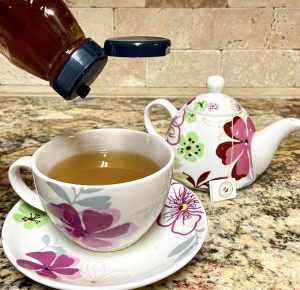Sugar or honey? The debate rages on, with honey probably edging out sugar in popularity. Many people use local honey because of it’s supposed benefit to allergy sufferers (immunotherapy). Others prefer it because it’s processed less than sugar, or because they simply love the taste.
People have been eating honey – or slathering it on their bodies – for hundreds of years. In ancient times, honey was used as a sweetener, as medicine to heal wounds, to relieve stomach problems, and even to fight bad breath. It has many of the same uses today. Honey contains trace amounts of acids that contribute to its antimicrobial activity, so when used on the skin it really can help heal wounds and reduce scar formation. The antioxidants in honey have been linked to properties that may fight cancer. Honey inhibits inflammation, leading to a protective effect for the heart and the whole cardiovascular system, and it’s a great remedy to help ease a bad cough. Does local honey really relieve allergies? There is some anecdotal (personal) evidence, but the jury is still out on that with no consistent clinical study results.
So, how do honey and sugar compare nutritionally? To start, both are carbohydrates, made up mainly of glucose and fructose. The body breaks them both down quickly and they each cause a spike in energy and blood sugar levels, although honey has a somewhat gentler effect. Honey weighs in with more calories at 68 per tablespoon versus sugar’s 49 calories per tablespoon. To balance out the calorie factor, honey is sweeter than sugar, so you may need to use less of it in your food. Honey may also be easier to digest because bees have already added enzymes that start to break it down. The bottom line is that both sugar and honey are sweeteners, they are nutritionally very similar, and using too much of either can lead to unwanted consequences such as weight gain, risk of illness, and tooth decay. Whether you use sugar or honey, it’s a great idea to limit consumption. The following tips may help, whichever sweetener you decide to use:
* Cut the amount of sweetener you use for drinks or
cooking in half and see if you still like the taste.
* Cut sweetener in baking by 1/3 or substitute mashed
banana for the sweetener.
* Add spices to substitute for some of the sweetener in a
recipe. Examples that add flavor without the calories are
almond, vanilla, and cinnamon.
Whatever tip you use, you’ll be ahead of the game if you can gradually cut the amount of sweetener you use, whether for cooking, baking, or drinking.
For more information about honey, sugar, or general nutrition, contact your local UF/IFAS Extension Agent.
- Nutrition Misinformation - August 8, 2021
- Belt or Booster? How to Keep Your Big Kid Safe - February 10, 2021
- Sugar vs Honey: What’s the Buzz? - August 17, 2020

